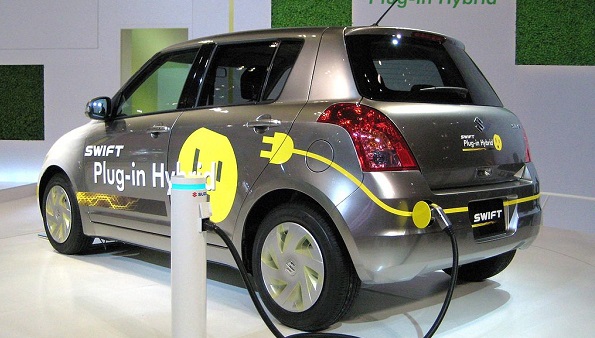Maruti Suzuki’s electric drive
April 29, 2019 | Expert Insights

Maruti Suzuki has announced that it will cease all production of diesel cars by 2020. Why has the company abandoned diesel engines?
Background
Maruti Suzuki is an Indian automobile manufacturer, a subsidiary of the Japanese company, Suzuki. The company has captured a majority market share of the Indian automobile industry - 54% as of December 2018.
Bharat Stage 6 (BS6) are Indian emissions norms based on European standards, scheduled to go into effect in 2020. Significantly, the criteria introduces a Diesel Particulate Filter (DPF) and Selective Catalytic Reduction (SCR) for all diesel engines sold in the country. Automobile manufacturers have rushed to research and develop technologies compatible with BS6 norms.
In 2013, the Government of India launched the National Electric Mobility Mission Plan (MEMMP) 2020 aimed at securing “national fuel security by promoting hybrid and electric vehicles in the country.” It targets sales of 6-7 million hybrid and electric cars per year beginning in 2020. In order to provide fiscal and monetary incentives, Indian authorities launched a scheme called Faster Adoption and Manufacturing of (Hybrid &) Electric Vehicles (FAME India). FAME India seeks to make hybrid and electric vehicles the first choice for Indian consumers.
Analysis
Maruti Suzuki recently announced that it would stop making all diesel cars beginning in April 2020, forecasting weak performance in the current fiscal year. Executives have blamed uncertain fuel prices and stricter emission norms for the weak growth rate. However, the Chairman of the company also said, “Depending on how customers react…if we find there is a market for diesel cars (after the new emission norms kick in) we will develop it in a reasonable amount of time.”
Indian authorities skipped BS5 in favour of implementing BS6 norms. This represents a leap in engine technology from BS4 to BS6. The primary objective of BS6 norms is to reduce the amount of sulphur engines release. BS4 (the current regime) releases 50 parts per million (PPM) of sulphur, while BS6 norms restricts this quantity to 10PPM. Additionally, BS6 reduces the amount of harmful fuel content such as nitrogen dioxide, carbon monoxide, carbon dioxide, particulate matter etc. BS6 fuel is already available for purchase in major Indian cities, meaning that oil refiners have already altered their production to meet these standards. However, these fuels currently cost more to produce than BS4 fuels. Automobile manufacturers have to adapt their engine technology to work with the new standard of fuel, while simultaneously reducing overall sulphur output.
Mercedes-Benz has been the only company to release a diesel model that complies with BS6 norms. Earlier regulations implemented in Europe boosted their efforts. Maruti Suzuki, given their narrower reach, has likely struggled to research and develop engine platforms that meet all of BS6’s requirements. By abandoning diesel vehicles all-together, Maruti Suzuki looks to capitalise on the incentives offered by FAME India, believing their consumer market is likely to seek hybrid and electric cars. To such an end, Suzuki has invested heavily in a lithium-ion battery manufacturing plant in Hansalpur, Gujarat. The under-construction facility is expected to localise the manufacturing of components required to build hybrid and fully-electric vehicles. Suzuki looks to regain lost ground to other major competitors in the Indian electric car sector including Mahindra, Hyundai, Ford and Renault, by partnering with Toyota. The partnership gives Suzuki access to Toyota’s extensive knowledge of the hybrid and electric market.
Counterpoint
The Chairman of Maruti Suzuki, R.C. Bhargava, said that the price viability of electric vehicles has yet to reach parity with combustion engines. Saying that electric cars will cost the average consumer double the price of combustion engines, the Maruti Suzuki executive believes that “electrifying a small car could go beyond the reach of small car owners."
Additionally, he thinks the lack of national infrastructure to augment electric vehicles (such as charging ports), means that Maruti Suzuki is unlikely to make significant progress in selling electric cars to the lower rungs of the market.
Assessment
Our assessment is that Maruti Suzuki believes that the comparative opportunity costs involved in developing diesel engines compliant with BS6 are more than those related to the pursuit of electric vehicles. We believe that in terms of securing India’s national fuel security and climate future, Maruti Suzuki has been adequately incentivised by government plans and schemes to pursue hybrid and electric technology. However, given Maruti Suzuki’s target market, current technologies make it difficult for the manufacturer to viably produce cheap and reliable electric alternatives to the combustion market.
India Watch
India’s march towards hybrid and electric vehicles is presented as an issue of ‘national fuel security.’ Unstable global oil prices, in tandem with geopolitical tensions and issues of climate change, forces Indian authorities to seek a reduction in the nations’ dependence on oil. India’s BS6 norms, FAME India and MEMMP is intended to wean the nation of its dependence on oil in a gradual manner.
Image Courtesy: Photo: Qurren (talk), with IXY Digital 10 compact digital camera. [CC BY-SA 3.0 (https://creativecommons.org/licenses/by-sa/3.0)]
Read more:








Comments